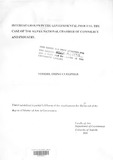| dc.contributor.author | Torori, Obino C | |
| dc.date.accessioned | 2013-05-08T11:09:02Z | |
| dc.date.available | 2013-05-08T11:09:02Z | |
| dc.date.issued | 1991 | |
| dc.identifier.uri | http://erepository.uonbi.ac.ke:8080/xmlui/handle/123456789/20281 | |
| dc.description.abstract | This study is designed to analyze and assess the role of Interest groups in policy formulation. The assumption is that the outcome of the activities of interest groups (defined as groups which seek to influence government policy without taking part in actual governing) are meaningful for the understanding of the governmental process. The study is also based on the belief that any changes that may take place through the activities of Interest groups is heavily dependent on the nature of the policy-making process. In this case, the general policy-making framework is addressed.
The study has adopted a case-study approach and examines the activities of the Kenya Rational Chamber of Commerce and Industry (KHCCI), the largest business association in Kenya. A field survey was conducted among carefully sampled members of the Chamber drawn from different categories of business. It was done in Hairobi.
The main findings are that the Chamber has not been able to realize fully its objectives as set out in Its K*»mor andum and Articles of Association. The main explanation is that there has been some perceived inability on the part of its leadership to articulate Its demands fully with the interests of its mothers at heart. Enmotlnv’s, internal divisions have come to bear on its activities, thus hampering its objectives. The overall assessment is that it has registered few successes but has exhibited weaknesses in crucial1 areas.
With regard to the policy-process, it has been shown that there is profound prejudice against corporate politics with provisions only for the organization of opinion by interest groups.
The recommendations that this Thesis makes are that the Chamber need to re-organize itself and stroamline its activities. IW^bould avoi situations of wrangles and Intra-group fightings which iyr « harmful for an organisation whose objectives are so crucial for the entire business community, ranging from the large industrial concerns to the one-man shop. On its part, the government needs to re-examine its policy stance vis-a-vis groups with a view to allowing mo r« participation by them In policy f or imi 1 a 11 on. Th* not 1 vi 11 n*~. of interest groups should be seen as contributory to the whole fabric of policy-making.
* | |
| dc.description.sponsorship | University of Nairobi | en |
| dc.language.iso | en | en |
| dc.subject | National Chamber of Commerce | en |
| dc.subject | Kenya | en |
| dc.subject | Interest groups | en |
| dc.subject | Industry | en |
| dc.subject | Governmental process | en |
| dc.title | Interest groups in the governmental process | en |
| dc.title.alternative | The case of the Kenya national chamber of commerce and industry | en |
| dc.type | Thesis | en |
| local.publisher | Department of Political Science & Public Administration, University of Nairobi | en |

